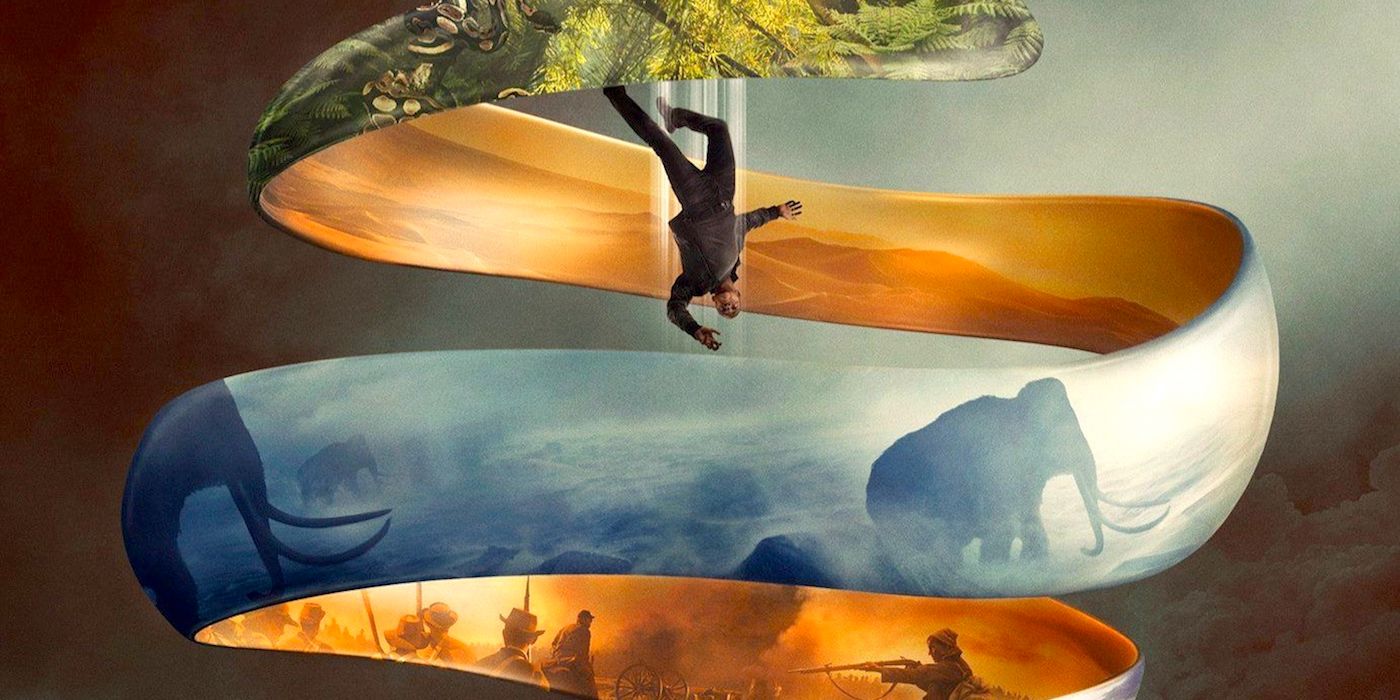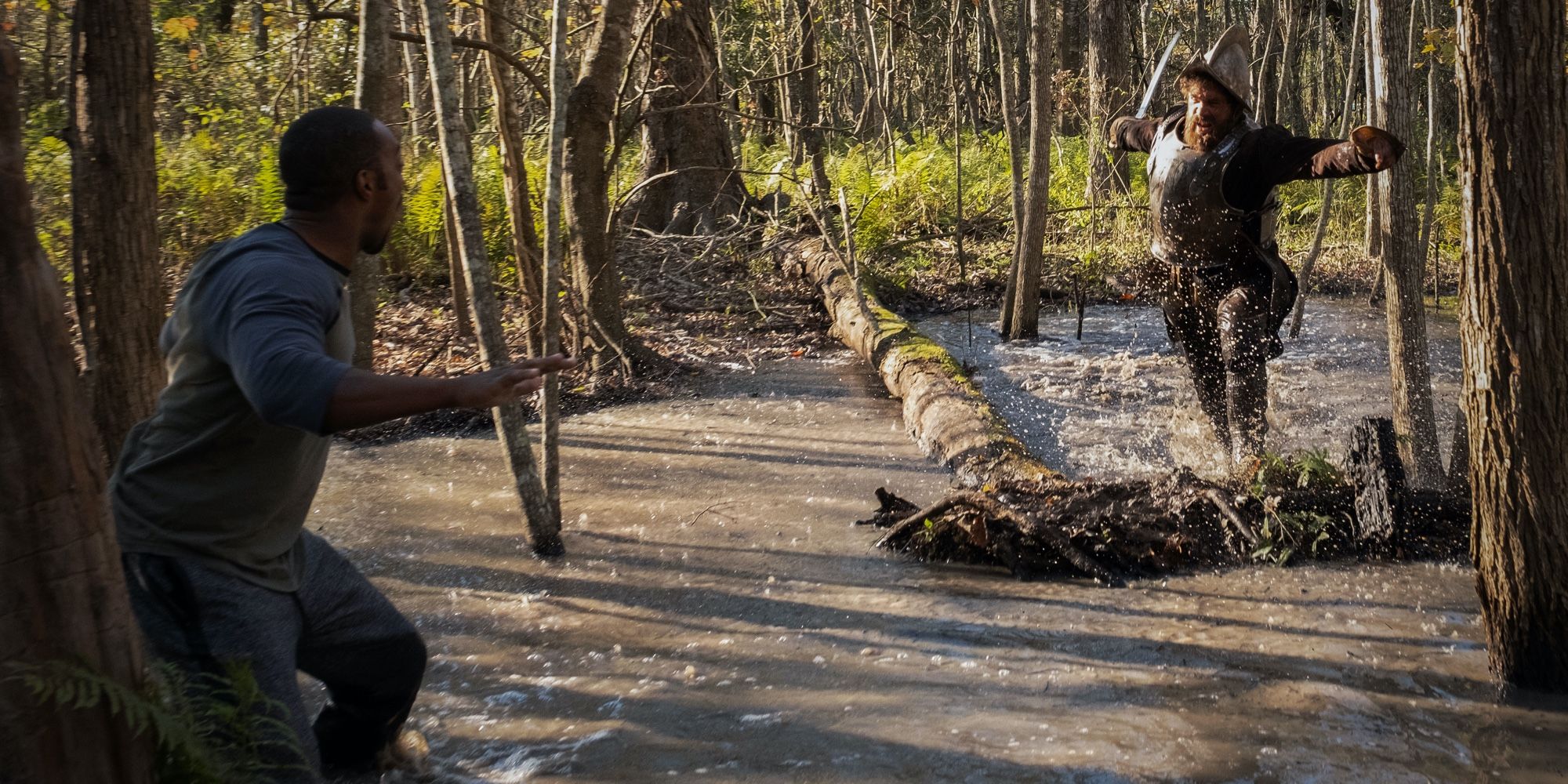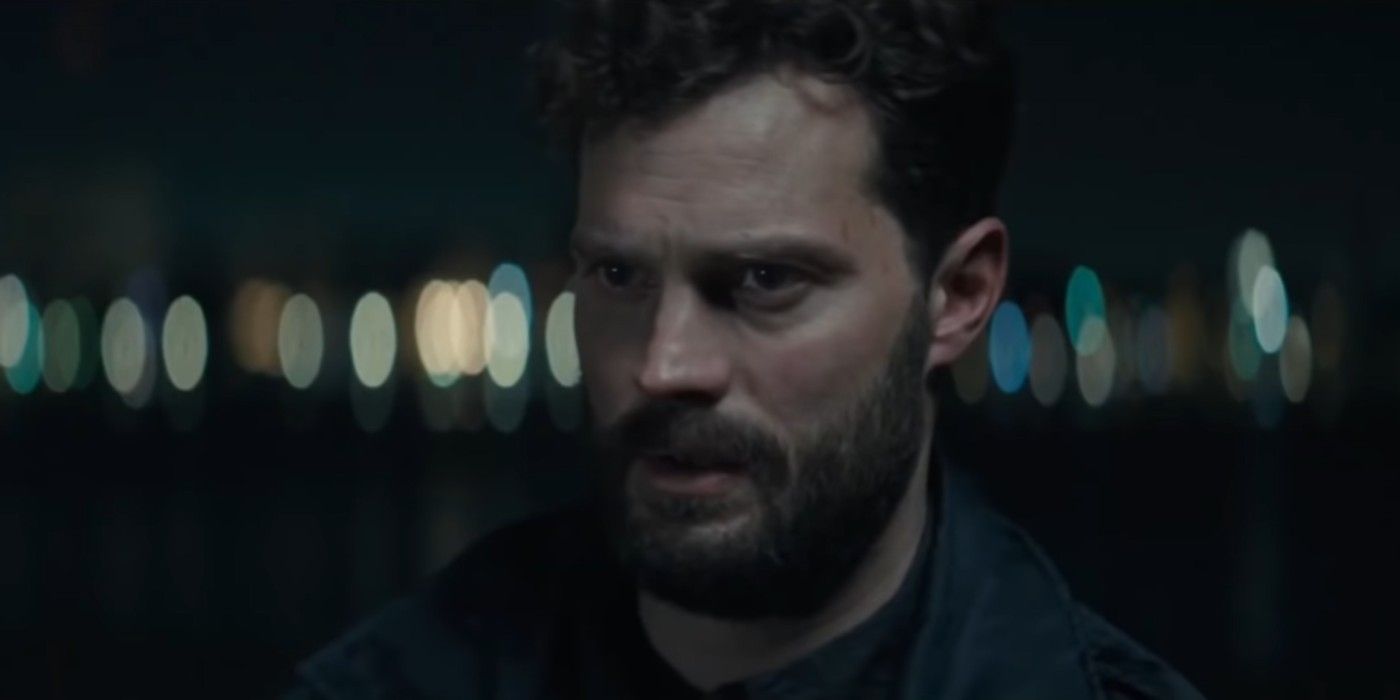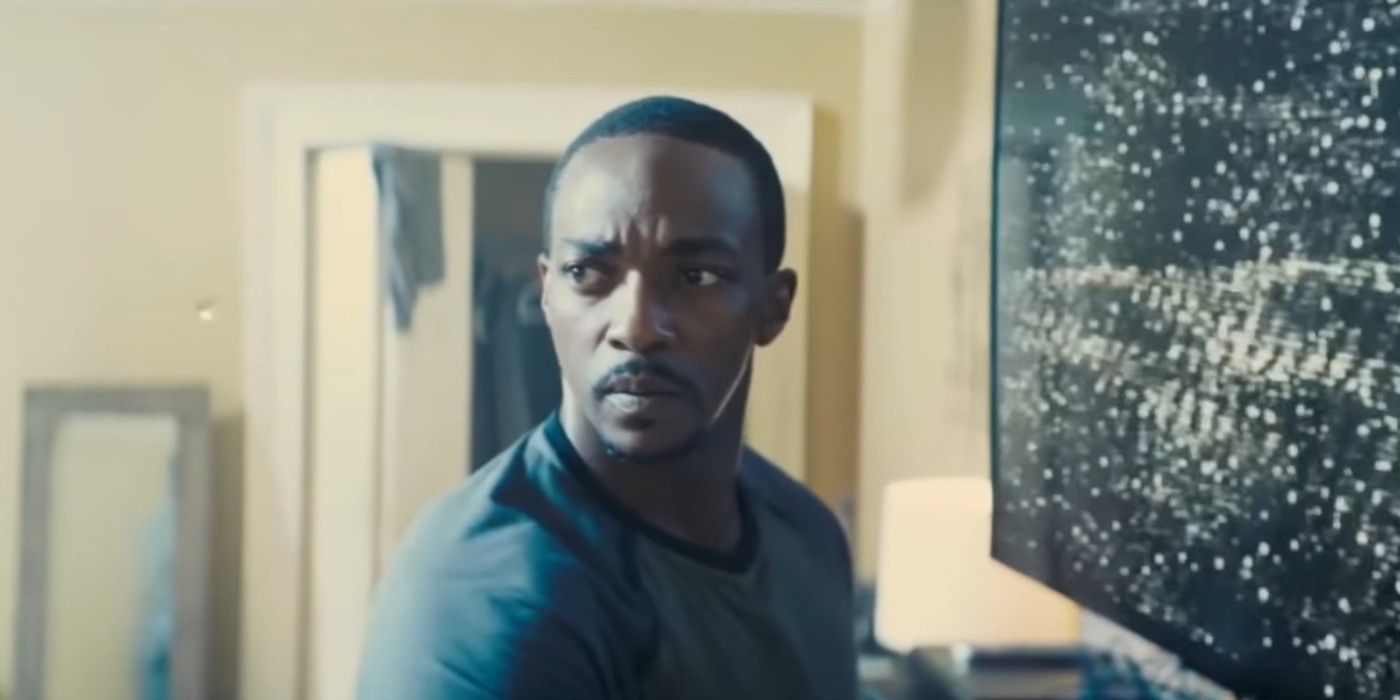Two of the hottest indie filmmakers in the business today are the duo of Justin Benson and Aaron Moorhead. Over the past few years, Benson and Moorhead made a name for themselves with their genre-bending indie thrillers like Resolution, Spring, and The Endless. Their latest movie, Synchronic, follows a pair of paramedics, played by Anthony Mackie and Jamie Dornan, who investigate a series of deaths that are connected by an exotic designer drug straight out of science fiction.
Sci-fi horror is a broad genre, and Synchronic pushes out in an effort to present viewers something they've never seen before. Synchronic pulls no punches in its depiction of drugs, the day-to-day struggles of working-class workers, and its more fantastical elements, in particular the film's unexpected focus on a peculiar form of time travel, brought forth by the eponymous drug.
While promoting the release of Synchronic, Benson and Moorhead spoke to Screen Rant about their work on the film, from their approach to developing a script, to the way conventions like genre and theme emerge naturally from the way they write their characters. They discuss how they wound up casting Mackie and Dornan, as well as preserving the movie's myriad surprises in its marketing campaign. Finally, they talk about how they make micro-budget indie movies and how their style of film may go away for a while in the wake of Coronavirus safety precautions, which tend to cost more money than the productions they protect.
Synchronic is out now in theateres, digital, and VOD.
For this movie, I don't know if it's your reputation or whatever, but your movies kinda transcend the realm of traditional "genre" and are kinda set within the realm of storytelling itself, is the way I like to describe movies that I really like and want people to see. Is that by design? Do you get an idea, do you get a character? What do you start with when you come up with a movie like this, like Synchronic?
Justin Benson: The idea and the character usually come up pretty close to each other. If the concept tickles out imagination, it's usually very quickly after that that the right character comes about. But the thing about whether we do this, sort of, maybe hard-to-describe, genre-wise thing by design? One thing is... It's bizarre, we very rarely talk about what genre we want the movie to be in. It's more about, hey, what's the interesting idea, and what is the best way to tell that story in the funniest, scariest, most human way of telling that? And just following impulses that are less based in genre or homage or "this meets this," but that said, very quickly after the first draft of the script, you have to be able to describe the movie as a "this meets this" and have a genre when describing it to anyone. Whether it's other producers or the audience or the people who you would hope the movie would appeal to. But yeah, I think the best way to put it is, there's no design, there's just following a bunch of instincts and then trying to define it after the fact.
Sure! It's one of those things where I want people to watch the movie, but I don't want to tell them that much about what it's about. I want them to go in as blind as I did. I'm lucky that in this job, they're like, "Hey, there's a movie and some people, do you want to see it?" I'm like, "Yeah!" So I see these movies, and I don't even look at the logline first, because it's like, why spoil it if I'm going to watch it anyway?
Aaron Moorhead: I ascribe to that, too. As soon as I've decided if I'm going to see a movie, I try to avoid anything about it.
Yeah, they're like, "A new trailer!" Nope, don't care, I'm already in. I don't need it.
Justin Benson: That's so cool. Thank you.-Well, for you guys, I know you probably don't have a terrible amount of control over marketing your own movies, that's done after it's left your hands. But do you have any kind of control over that? You see these movies where they'll put the last shot in a trailer. Not to name any names, but you know what I mean.
Aaron Moorhead: We don't have control over the marketing. However, we can definitely say that we've been super lucky that our distributor, Well Go, for this movie and The Endless, they distributed that as well, they've been extraordinarily collaborative. One thing that we are able to offer is, we can, at early on meetings with them, tell them what we think appeals about the movie. And where that comes from, actually, is traveling with the film to film festivals. We'll even ask people, "Why did you come see this movie, what was it? Was it us? Was it Antony Mackie, Was it Jamie Dornan? Was it the central concept of the film? Or was it just a cool picture you saw? Was it a poster?" And we can actually offer that input. And they also let us give input to designing the trailer and the poster and all that. But really, that is out of our hands, and we don't want to take anything away from the marketing people who create those things. But then, also, at a certain point, things just started appearing on the internet that we didn't know existed. And there is a marketing department churning out stuff for this film, which is punching way above its weight. It's not a studio film. It's still a small distributor doing its thing. But yeah, we get some input, we have no control, but they listen to us. It's a very healthy collaboration.
Speaking of that behind-the-scenes relationship between filmmakers and a distributor, you make independent films. You've probably been over this a million times, but this is a very different season for independent films. You're not touring the film festivals, at least not in the same way as you would have a year ago. I've talked to people who've made movies this year and how weird it is, and I've talked to people who made movies that were supposed to debut at film festivals, and that didn't happen, and they don't know what's going to happen to their movies. So, I guess you don't get to take the traditional victory lap of a guy with Hors d'oeuvres and free cocktails and all that, but how are you clinking your glasses together now that this movie is finally going to be out in the wild and people can consume it, but you can't go to a party to celebrate that fact?
Justin Benson: We're celebrating by making another movie! We're approaching the end of week three on another small movie. It's really nice. We've never... I don't think we've ever been shooting another movie during the release of a movie, but it keeps you much more emotionally healthy.
Aaron Moorhead: You're not reading all the press...
Justin Benson: There's no time to obsessively see what reviews you're getting and how people are talking about it. But also, on the topic of this time period, this time in history... Up until Covid, we were going through this really extraordinary golden age of, like, the $200,000 to $500,000 US dollars independent film, the budget. The technology and production methods of doing that, you could make these films! And so many great films came out of that over the last decade. A lot of our movies were those movies! And now, with the way things are for a while, we're not going to have those movies. There will be no $200,000 to $500,000 movies for a while, because most of that... I mean, it's about $200,000 to have a Covid-safe set.
Aaron Moorhead: And that's just for a small movie. Which means you're doubling... Without increasing the value of your movie, you're doubling its budget. We know that the $6,000,000 sets, that's almost like a million dollars in Covid safety, and it's almost impossible for anyone... I mean, everyone's in an impossible situation. There's no answer. As a creator of films, I wouldn't know what to tell distributors and exhibitors, financiers... It's almost impossible. You have to find this silver bullet of a film that happens to have the exact right cost delta, you know? Or go make a movie with your three friends that is fully quarantined, for almost nothing. That's also a way to adapt.
Is it too early to ask which of those your current movie is?
Aaron Moorhead: Oh God!
Justin Benson: Oh, it's... To sum up, there's two options here. You can either do an essentially no-budget movie... Well, nothing is "no budget," but... Substantially less that $200,000. You can do that, or you can do something giant. Like a big TV show, a big movie... You'll be shocked, but we haven't been hired for one of those. That was sarcastic. (Laughs) But we're doing the one we can do. The essentially almost no-budget thing.
Sure. You got two... Maybe the two hottest guys, not just in Hollywood, just around. If you see those two guys...
Aaron Moorhead: Good lookin' dudes!
They're so handsome!
Justin Benson: Sexy guys.
Aaron Moorhead: Like, please just get some acne right here (points at his head) so that we can just, like... I don't know. (Laughs) They are so beautiful.
They are paramedics, but they also model on the side. Well, how did you get these two guys? Did you seek them out, did the script fly by their desk and they call you up and they're like, "Hey, I'm Anthony Mackie, and I want to be in your movie?"
Aaron Moorhead: That would have been great! The story is actually, to take it back... For three movies, we've been trying to get other movies off the ground that had what one would call a traditional movie star or celebrity or something like that in it. And they didn't happen, so we'd make the second movie, Spring, and then we made the third movie, The Endless. And we kinda lost faith in the idea that it actually works. Like, I guess that just works for other people, and for whatever reason, doesn't work for us." But we'll keep on trying. And in the meantime, we'll keep making our smaller movies. Synchronic was written before The Endless. When The Endless came out, an agent named Houston Costa went to go see it on a lark, on its last screening in North Hollywood because he liked the poster, and he just walked on in. And that's Jamie Dornan's agent. who called us up and just went nuts over us. He's a really cool friend and just an amazing agent. And we were able to get Jamie Dornan in Synchronic. And Jamie and Anthony had always wanted to work together, so there was a connection there, at the agency and professionally. But also, the director Joe Lynch was working with Anthony, and we hit him up and said, "Can you tell Anthony we're gonna send him the script, and maybe he'll read it?" On top of that, we heard from Anthony, and we can't verify this, but we heard from Anthony that the Russo brothers, for whatever reason, told Anthony, "Hey, if you ever get the chance to work with those guys, you should." I don't know in what context that happened, but we heard it, so...
With that in mind, you wanna do movies where you have complete creative control. But if the Russos come up to you and go, "Hey, you wanna do Doctor Strange or whatever?" What are you gonna do?
Aaron Moorhead: (Laughs) We'll do Doctor Strange.
Justin Benson: For sure, if we ever had the opportunity to do something... To do Doctor Strange, we'd definitely do Doctor Strange if that opportunity would present itself.
What you were saying before about casting... Was it always going to be you two in The Endless?
Justin Benson: Yeah. Everything in The Endless was constructed to be as do-it-yourself as possible. It was weird because it got a little bit... It's funny, it's still a tiny movie, but it got a little bit bigger than we anticipated when our producer, Dave, proposed that we actually seek financing for it. Aaron and I were just gonna pay for the whole thing. Again, it's still a tiny-budget movie, but it was the first movie where an investor came in and helped us out a bit, so it got a little bigger, but originally, it was even smaller and it was always written for Aaron and I to play those characters.
I want to get as many people as possible to see a movie we're talking about but talking around, so I dunno, could you give your... To the Screen Rant reader, why this movie is important and worth watching?
Aaron Moorhead: I'll give a shot, which is... Are we talking about time travel? Is that a spoiler? I don't know...
Hey, it's your movie!
Aaron Moorhead: Just making sure! A lot of movies that involve time travel get really into the mechanic of, can you change the past or something like that. This movie tries to completely change the way we look at time travel, as something that's not a form of wish-fulfillment, but is actually a horror, and something that we shouldn't really want to go back to, and instead we should be embracing the present. In some ways, the movie is calling for a recognition of human connection as one of the most important values that we have. That is how I would pitch the movie without talking about the plot.
Sure. Well, thank you so much, the movie is fantastic. I'm gonna let you go now, but whatever you do next, I'm gonna be there, too.
Justin Benson: Awesome, thank you man!




